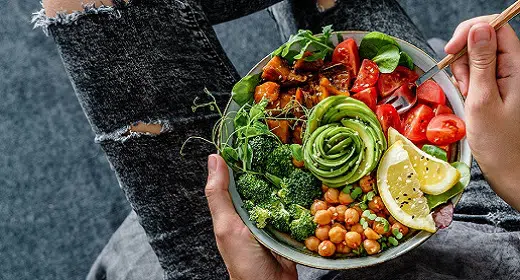by Jill Schildhouse: Instead of jumping headfirst into a plant-based diet, take the time to prepare for success…
Congratulations on making the decision to adopt a plant-based lifestyle. While you’re no doubt feeling excited about the positive changes this will bring to your health and our planet, it’s common to feel a bit overwhelmed, too. If you’ve spent the majority of your life making meat the centerpiece of most dinner plates (not to mention your breakfasts, lunches and snacks), then there’s going to be a bit of a learning curve during your transition. The key is to proactively prepare for the change, rather than trying to wing it.
“I want to emphasize the importance of being kind to and patient with yourself while making a lifestyle change,” says celebrity chef, nutritionist, and reiki master Serena Poon, CN, CHC, CHN. “Please don’t feel that you need to make the shift perfectly or even gracefully. It may take time to shift to a plant-based diet and that’s okay. Once you have been eating a diet rich in vegetables, fruits, nuts, seeds, and whole grains for a little while it will become intuitive and energizing.”
So what are the common pitfalls to diving into the deep end without enough preparation?
Eating vegan junk food.
“One of the main missteps I see when people shift to a plant-based diet is heading straight for packaged vegan food,” says Poon. “These foods are okay in moderation, but a plant-based diet that supports health would have a foundation in vegetables, fruits, nuts, seeds, and legumes, and whole grains.”
Relying on meat and cheese replacements.
“I often see people trying to recreate their previous diet with vegan substitutes,” she continues. “Many plant-based meat and cheese replacements are highly processed, so even though they are plant-based, you would want to consume them in moderation.” Give the dynamic and robust plant- and legume-based diet a try, as you might be surprised by how much you love eating fresh, whole foods.
Worrying that you won’t be satisfied on a plant-based diet.
If you head into your plant-based diet with a “lack” mindset, Poon says you are setting yourself up for disappointment. Rather than focusing on the foods that you won’t be able to eat, think about the incredible, nourishing foods that nature has to offer.
Eating the same thing every day.
It can be easy to get into a rut with your food options on any eating regimen. The good news? Plant-based eating doesn’t mean endless salads or a bunch of veggie “side dishes” masquerading as a cohesive meal. Try to switch up your recipes and meal plan to make sure you don’t get bored with your plant-based options.
Not eating enough veggies and fruits.
“I’ve seen people try to make it on a ‘plant’-based diet, but end up eating mostly grains,” says Poon. “The most health-supportive diet is going to be one that is rich in vegetables and fruits.” Start by familiarizing yourself with these 12 nutrient powerhouses.
Not using spices and sauces.
Not only do herbs and spices deliver wonderful healing benefits, they also enhance the flavor of your food. Gracious use of herbs and spices can make a grain bowl go from a boring meal to a culinary delight. Try using various herbs, spices and oils to enliven your plant-based meals.
Thinking that a plant-based diet is a cure-all.
“You might be starting a plant-based diet to lose weight or to get healthy, but it’s important to understand that wellness does not occur within a vacuum,” explains Poon. “Healthy eating is just one part of a holistic wellness plan. Your physical and emotional wellness are key components to achieving your goals as well.”
Not balancing proteins and amino acids.
You want to make sure that you are including foods in your diet that supply the full spectrum of amino acids. Plant foods that supply full proteins include tofu, tempeh, quinoa, spirulina, and hemp seeds. You can also combine foods to achieve complete proteins. For instance, Poon says combining whole grains with beans or beans with nuts can help you achieve a full amino acid profile.
Not knowing how to handle social situations.
It’s also important to consider how you will eat at restaurants and family functions. “It definitely depends on your family, but if you live with a lot of meat-eaters, you might have to get comfortable saying no,” says Poon. “Depending on where you live, you might also need to get creative with what you order.” If you are going out with a group, one good way to handle this at first is to look at the menu online before you go and pre-plan how you will get in a satisfying plant-based meal.
Not considering how your digestion will handle the initial increase in fiber.
Sometimes when you begin to eat more vegetables, it can give your digestion a stir. “Raw veggies can cause gas and bloating in some cases,” notes Poon. “If this happens to you, try eating your vegetables in a variety of forms: cooked, baked, and raw. Make sure to also drink a lot of water to help the additional fiber run through your digestive system.” Thankfully, this digestive discomfort often subsides after a bit of time eating more plant-based foods.
Additionally, no matter what your eating regimen, it is crucial to listen to your body. “Especially as you begin to transition to plant-based, if you are feeling fatigued or depressed, you might be missing out on some key nutrients,” says Poon. “If a food that everyone loves doesn’t sit right with you and your body, you don’t have to eat it. You can always work with a nutritionist to ensure that you are eating in a way that best serves you and your unique constitution.”









































